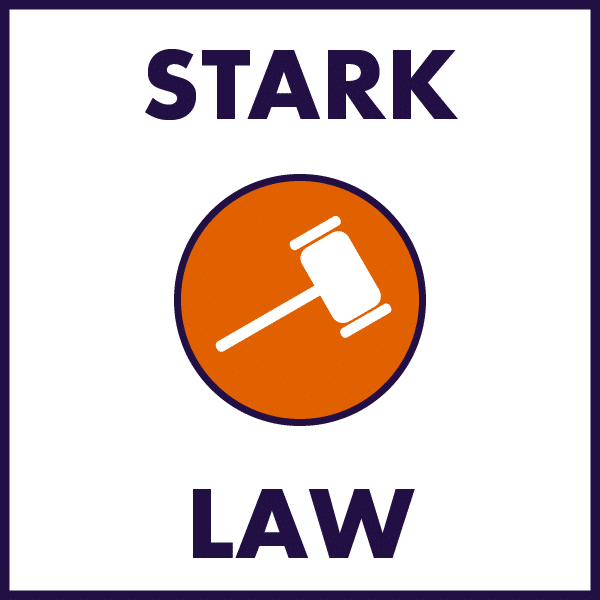STARK LAW
SPIN Compliance Solutions is the premier hands-on HIPAA, MACRA/MIPS, OSHA, Stark Law, and Anti-Kickback Statute Compliance Training Company serving medical practices in the continental US. We have been passionately saving physicians from compliance penalties since 2018. Our mission is simple... Take the time and frustration out of keeping your practice compliant so you can focus on your patients and practice.
If you want to take the frustration out of keeping your practice compliant then you won’t find an easier solution. Our hands-on compliance training and security audits provided by our exceptionally trained staff make it possible for you to focus on your practice. Contact us now so we can take the headache out of keeping you compliant today.
HOW TO COMPLY WITH THE STARK LAW:
Stark Law – Background:
WHAT STARK LAW PROHIBITS
DHS
- Clinical laboratory services.
- Physical therapy, occupational therapy, and outpatient speech-language pathology services.
- Radiology and certain other imaging services.
- Radiation therapy services and supplies.
- Durable medical equipment and supplies.
- Parenteral and enteral nutrients, equipment, and supplies.
- Prosthetics, orthotics, and prosthetic devices and supplies.
- Home health services.
- Outpatient prescription drugs.
- Inpatient and outpatient hospital services.
We specialize in HIPAA, MIPS, OSHA, Medicare/Medicaid Audits, and more. View our services and see how we can help your medical practice today.
Our program offers cost-effective solutions to organizations so you can avoid HIPAA audits and monetary fines. Call Us Today!
Providing The Best Hands-On STARK LAW Compliance Training Programs To Medical Practices in St. Louis, MO., Atlanta, GA., Houston, TX., Philadelphia, PA., Hershey, PA., Oklahoma City, OK., Reno, NV., Orlando, FL., Detroit, MI., Orange County, CA and the continental United States.

FINANCIAL RELATIONSHIPS
Penalties and Violations
Sanctions for violations of the Stark law include the following:
- Denial of payment – Medicare is prohibited from paying for DHS furnished pursuant to a prohibited referral.
- Refund of payment – Any entity that collects payment for a DHS furnished pursuant to a prohibited referral must timely refund all collected amounts
- Imposition of civil monetary penalties
- Exclusion from federal healthcare programs — Physicians and entities that violate the Stark law can be excluded from participating in the Medicare and Medicaid programs.
Stark Law Exceptions
- Physician Services
- In-Office Ancillary Services
- Services Furnished by an Organization to Enrollees
- Clinical Laboratory Services Furnished in an Ambulatory Surgical Center, or End-Stage Renal Disease Facility, or by Hospice
- Academic Medical Centers
- Implants in Ambulatory Surgery Centers
- EPO and Other Dialysis-Related Outpatient Prescription Drugs Furnished in or by an End-Stage Renal Disease Facility
- Preventive Screening Tests, Immunizations, and Vaccines
- Eyeglasses and Contact Lenses Following Cataract Surgery
- No Knowledge of Prohibited Referral
- Electronic Prescribing Items and Services Electronic Health Records
- Exceptions to the Meaning of “Compensation Arrangement”
- Non-monetary Compensation Up to $300
- Fair Market Value Compensation
- Medical Staff Incidental Benefits
- Risk Sharing Arrangements
- Compliance Training
- Indirect Compensation Arrangements
